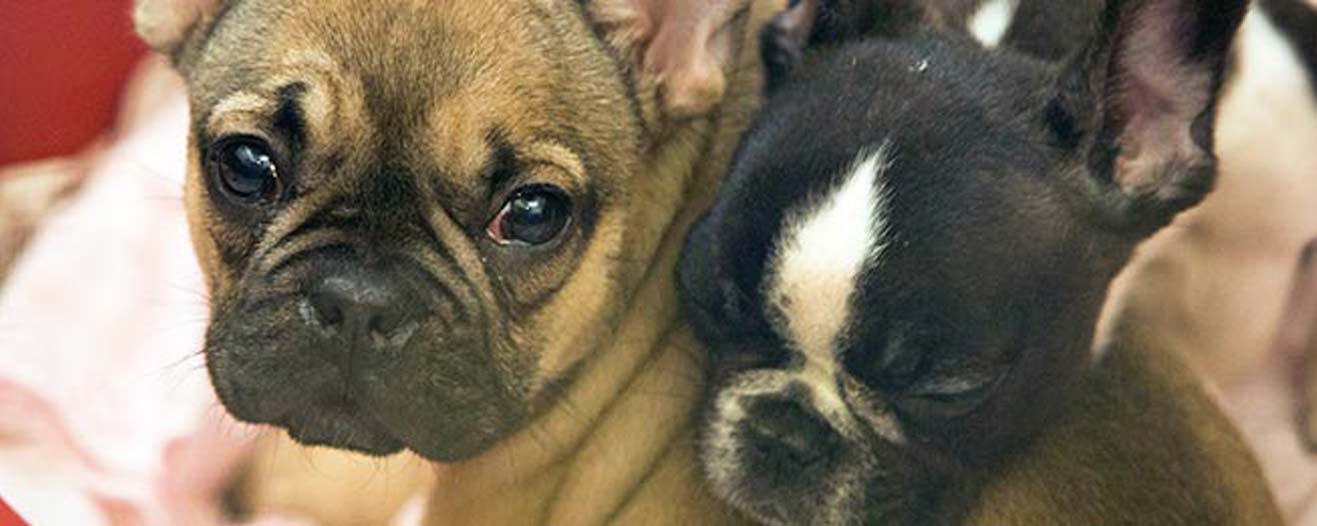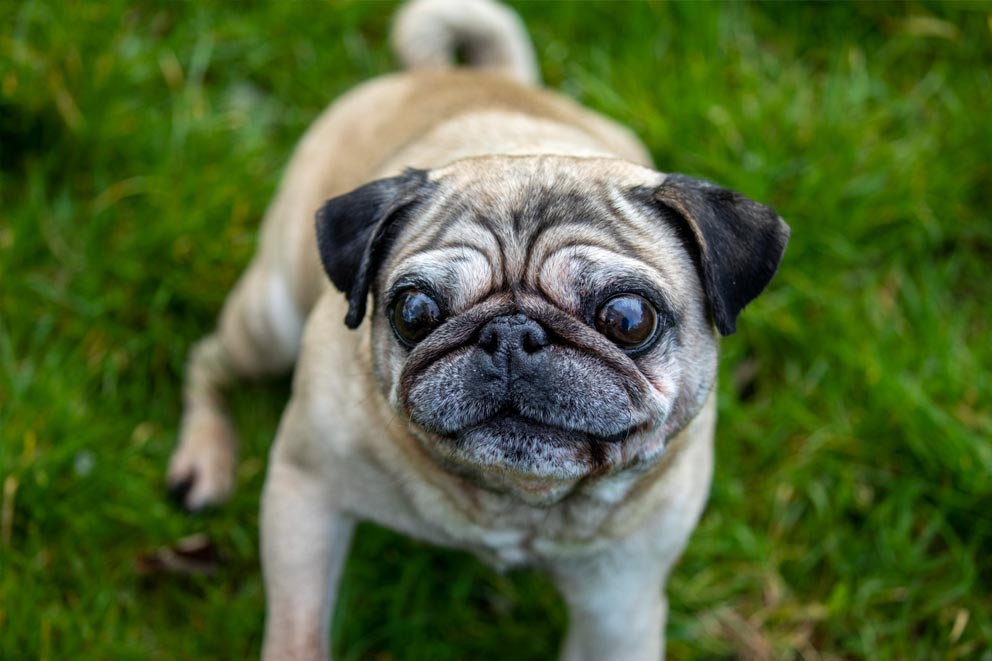Selective breeding
Most dog breeds were originally selected for particular purposes, such as hunting or guarding property. Humans selectively bred dogs that were best suited for the various roles required of them, based on their fitness, ability and utility.
Nowadays, in order to win dog shows, pedigree dogs have been bred to emphasise certain physical features in accordance with breed standards set by the Kennel Club. The dog who is judged to most closely match its breed standard is awarded the winner.
As a side effect of keeping different dog breeds separate, and focussing on breeding for appearance, there's a lack of genetic diversity within dog breeds. This lack of genetic diversity can increase the risk of inherited diseases like cancer and blindness.
Exaggerated features that can cause dogs to suffer
Below are examples of problems that pedigree dogs can suffer from as a result of selective breeding range from irritating to life-threatening issues, or those that require risky surgery.
Head
- Pugs, French bulldogs and other similar types of 'designer' dogs have short, flat faces and therefore often have narrow nostrils and abnormal windpipes. Flat-faced dogs are called brachycephalic, many of these dogs have breathing difficulties and struggle with exercise.
- Bulging or sunken eyes are prone to injury, pain and discomfort.
- Long floppy ears often suffer ear infections or injury and can't move their ears to communicate with other dogs.
There's been a lot of media coverage recently about 'brachycephalic' dogs (dogs with short, flat faces) because many of them suffer from serious health issues. In recent years the popularity and ownership of these dogs had grown drastically, fuelled in part by their increased use in advertising and the media. Although their squishy faces and big eyes are often considered cute or comic, sadly these features can cause painful health problems and prevent dogs from being able to enjoy normal activities like playing and running. It can also be really distressing and expensive for owners.
The breathing problems that these dogs are at risk from are well-documented. But did you also know that many brachycephalic dogs also suffer from eye problems? A recent study found that brachycephalic dogs were 20 times more likely to be affected by painful eye ulcers than non-brachycephalic dogs. Another study found that extreme brachycephalic dogs died at a much younger age (8.7 years) when compared to other dogs without short, flat faces (12.7 years).
Body
- Dogs with a large head and small hips have trouble giving birth which can risk their lives or require surgery.
- Very large and heavy dogs are more likely to suffer heart, digestion, muscle and joint problems and live shorter lives.
- Dogs with long backs can suffer crippling deformities whilst those with ridges along the back are prone to nervous system problems.
- Very curly or short tails can make it difficult for dogs to communicate as they can't raise or wag their tail.
- Screw or corkscrew tail dogs can suffer with crippling back deformities.
Skin
- Folded and wrinkled skin can get itchy and sore whilst also causing infolding eyelids that scratch the eye.
- Hairless dogs struggle to keep warm.
Stopping health problems in pedigree and purebred dogs
We believe that all those who breed dogs - whether pedigree, purebred or crossbreed - should prioritise health, welfare and temperament over appearance. This will help protect the welfare of both the parents and puppies.
We want to help potential puppy buyers choose puppies that have been bred to have the best chance of being happy and healthy.
If you're thinking of buying a puppy, avoid the pitfalls of buying from an irresponsible breeder, use The Puppy Contract.
What can we do to help?
Owning a dog who has health problems can be devastating. And it can be really hard taking that leap and thinking, 'this isn't ok', especially when we're faced with thousands of YouTube videos of 'funny pugs snoring'. But if your flat-faced dog snores or snuffles, or your dog (of any breed) has any issues or symptoms which you might have been told are 'normal for [insert breed here]', don't believe the YouTube videos and ask for some advice from your vet. Your pet may have a health problem and they could be missing out on the treatment that'll help them live a more comfortable life.
When getting a dog
If you want to add a dog to your family, why not consider rescuing one? Your local RSPCA centre or local breed rescue might have your perfect dog.
If you decide a puppy is the right choice for you, by doing some research and using the puppy contract you can give yourself the best chance of buying a happy, healthy companion you can spend many happy years with.
Think twice about getting a breed with serious health issues, and as well as all of the usual questions to ask breeders, ask them whether either parent has had any surgery to fix problems that the puppy could inherit. Some breeds also have trouble giving birth naturally so make sure you ask if the puppies have been born by c-section.
There are some great breeders out there who love their dogs and work hard to make sure they breed happy healthy puppies. They'll want you to visit more than once, won't force you into buying on the first visit and will grill you about your home and lifestyle to make sure their puppies are going to good homes.
Looking beyond looks
Our science team's view:
As a dog lover, it makes me really sad when I see dogs struggling to breathe, walk, play, or live a normal happy life because they've been bred to look a certain way, whether that's for profit or to win a show.
We're so privileged to have dogs in our lives - they're incredible animals and in my experience, they bring happiness, love and laughter into our lives! So wouldn't it be great if we placed less focus on what dogs look like, and instead judge them on their behaviour, health and welfare so that ultimately, all dogs are bred with the best chance of living happy healthy lives?
Rescue is the best breed
Have you considered adopting one of our rescue pups? We have so many different animals ready to be loved and all patiently waiting for their forever home right now!
Download factsheets





